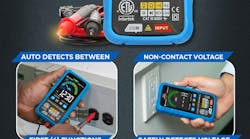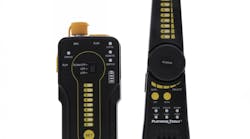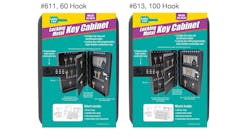Although there will always be the customer who thinks retail locksmiths “cut keys for a living,” there is actually a laundry list of things the security professional does on a repeated basis to make their money.
In addition to key duplication and origination, most locksmiths act as security consultants, job surveyors, cost estimators, sales, service and repair specialists and more. Apprentice, journeyman or skilled technician, your customers require you to continuously learn about new products and techniques to stay in business.
As the various specialty fields of our industry have grown and expanded over the past decade, some locksmiths have chosen to specialize or focus in a specific area. Three of the most popular specialty fields are; safes, automotive and access control. I spent time with three retail locksmiths to see how and why they decided to specialize.
SAFE SPECIALIST
Gene Gyure owns Starfleet Lock & Safe in Springfield, Ill. He has been in the locksmith business since 1980. Starting as a bicycle repairman in a combination locksmith shop and bicycle dealership, repairing bikes was okay, but he took every spare minute he had to learn the ‘other side’ of the business.
Gyure opened his own business after his former employer closed up shop. Starfleet is a two-service vehicle business located in an industrial section of town. The store has recently increased its square footage, enabling new office space and a safe showroom to further boost the business. Safes on display include Amsec, Meilink, Gardall and General brands in various configurations. Burglary, fire, personal and deposit safes provide a wide choice for the customers. Some reconditioned safes round out the selection.
Although Starfleet still does commercial master keying and re-keying, some residential lock work and basic automotive, safes are the specialty. The safe work specialization includes servicing mechanical and electronic safe locks as well as opening safes, vaults, time locks, safe deposit boxes and GSA containers. Gyure also retrofits electronic safe locks onto customers’ safes for ease of operation.
Specialized work requires special tools. Gyure has invested heavily in hardware. Special drill bits, drill stands and drill motors are only the beginning. Standard and oddball safe change keys, various boroscopes, viewing cameras, monitors and attachments, as well as a wide variety of repair and replacement parts and lock mechanisms are kept on hand to be able to do a complete job in one trip at the job site.
The biggest tool in his arsenal, though, is knowledge. The wide variety of reference material is probably more important than anything. The ability to decipher drill points and angles, lock construction information and exploded views of locks makes the job go usually as planned.
An ALOA Certified Registered Locksmith, he also is a member of the Safe and Vault Technician’s Association, SAVTA, and is certified by various manufacturers to do specialized lock work and open, service and repair GSA containers.
Ongoing training includes attending the Clark Security Products 2008 Security Conferences and Expo in Chicago and the SAVTA convention.
A lot of local locksmiths happily refer safe work to Starfleet because they don’t have the technicians or knowledge to do detailed safe openings and repair. It was this void combined with the challenge that led him to focus on the field.
Gyure has done numerous jobs for law enforcement agencies and the military. He estimates that about 70 percent of his business is warranty and repair work for the national service contractors and safe manufacturers.
When he gets stumped or needs a question answered, he relies on other safe specialists and the Internet. Paul Schaeffer is an experienced Diebold/Mosler technician who shares valuable information with Gyure on occasion and also calls him for information. With the locksmith forums on the internet, detailed information can also be exchanged with a wide selection of security professionals possessing a total of hundreds of years of combined experience.
Planning to continue focusing on safes and related work, Gyure is looking to acquire an updated safe moving trailer that carries heavier loads and more safe moving equipment, including a stair climber.
The company advertises the specialized services it offers on business cards, their service vehicles and in a small online Yellow Pages ad. Their website also offers a free security survey checklist and tips for travel security.
Gyure stressed that the most effective advertising is word-of-mouth referrals from satisfied customers.
AUTOMOTIVE SPECIALIST
Bob Pulley owns C & R Mobile Locksmith Service in Collinsville, Ill. Started in 1976 by his father, Bob inherited the company in 1982. His previous work experience was in the electronics field as a repairman for coin-operated vending machines, juke boxes, pinball machines and video games (remember Space Invaders?).
Specializing in the automotive field, his electronics background has
come in handy. Pulley covers all aspects of the automotive security spectrum. Duplicating and generating keys, repairing and replacing locks, lockouts, re-keying and replacing keyless remotes are part of the picture.
As with safe work, specializing in automotive work requires a large investment in specialty tools and stock. Various makes and models of diagnostic and programming tools are required to offer full service. Joined by a wide variety of mechanical and transponder key blanks and replacement locks and parts, the investment can be substantial.
“In addition to the variety of multi-vehicle programming units available today, look for a whole new field coming from China,” Pulley adds.
He also explained that you need to be willing to buy certain specialty tools even if you know you may never fully recover your investment cost. If the tool allows you to offer a more complete range of services to your customer, it may bring repeat business in a different field or category.
The fact that the general public has become aware of the increased cost of newer auto keys and that many times two are required to make a copy has increased Pulley’s business from auto dealers and repair shops.
More and more used vehicle customers are realizing the expense involved in obtaining a second transponder-equipped key. They know you need two; a used car with only one key can be a deal-breaker. Dealers will often call him to make duplicates for cars on the lot with a single key.
Although auto auctions aren’t a big part of his business, one insurance auction customer makes sure that even wrecked and totaled cars have two keys. They’ve found that the value of even the wrecked vehicle is increased when a complete set of working keys is provided to the buyer.
The Internet continues to provide a wealth of updated information for him. In addition, two groups host automotive specialty seminars and training that Pulley takes advantage of to boost his knowledge. Just Cars and Pure Auto are both training companies offering educational seminars throughout the country.
Because most other locksmiths in the area didn’t take advantage of the emerging technology, they got behind in the information required to keep pace with the automotive field.
With all of the technology in the current automotive field, he still gets the classics to work on. When we spoke, he was on the way to impression keys to a 1968 Dodge Charger RT. It seems the local locksmith that was called contacted a dealer before going to the job. The dealer informed him that those keys could only be made by code. Since the locksmith could not find a key code, he left. That’s when they called Pulley.
Since the automotive field has been good to him, he plans to continue focusing on the work. He is constantly visiting dealers and auto repair shops to inform them of the key originating, duplicating and lock repair services of automotive work he offers.
Although a number of multi-vehicle programmers exist, Pulley would like to expand his collection of original equipment diagnostic tools.
Pulley wanted to be sure to mention a mentor that has helped him gain confidence through the years and showed him he could do if he tried. Randy Mize of St. Louis has made transponders and high security automotive his focus. With 30 years experience, Randy is an inventor of automotive specialty tools, an instructor and a consultant to lock and vehicle manufacturers.
ACCESS CONTROL SPECIALIST
Tim Gillespie is the owner of Access Control Enterprises in Orange, Calif. After spending 28 years doing standard retail locksmith work around southern California, he opened his own business in 2000.
During his retail work, subcontracting access control jobs for other companies brought him in contact with a variety of sources. These contacts led to a heavy stream of government, military and industrial requests for work.
Although he specializes in Access Control, CCTV and related jobs, he still does safe openings, master keying and security products consultation for his customer base.
Another skill developed through his locksmith career includes security welding. Fabricating security gates and window grates, welding steel security mounting boxes in place and repairing damaged gates, fences and door frames allows him to offer a full line of security services to his commercial-industrial customer base.
His customers include alarm and government contractors so he spends a lot of time servicing GSA customers and government facilities. A majority of his work is fulfilling the needs of subcontractors at Armed Forces bases.
A valuable asset, Gillespie is certified to re-label Warnock-Hersey fire doors. In addition to constant training and new product familiarization, he looks forward to the ISC West conferences and trade shows on an annual basis.
In addition to a wide variety of standard locksmith tools, his specialized equipment includes drilling jigs to guide drilling a raceway through a door core to run wiring, extra long drill bits and a variety of battery operated drills, hammer drills, cut-off saws and jigsaws.
On the CCTV side he utilizes a small LCD video screen that is hooked to a camera being mounted. Resting on his chest and angled upward, the screen displays the camera’s view as he is installing it. By viewing it at the top of the ladder, he saves multiple trips up and down to the main monitor to get the angle, focus and lens properly adjusted to cover the area intended.
The work Gillespie does comes from a variety of sources. Other locksmiths refer customers to him for complicated installs. Manufacturers and national service providers ask for assistance to satisfy their customers, and he has a solid base of ‘word-of-mouth’ referrals from his satisfied customers.
When he gets stumped, he finds the Internet sites and telephone contacts offered by the product manufacturers most helpful. In years past, an old locksmith friend and mentor –Bob Dobolina – was a constant source of information, advice and consultation. Unfortunately, Dobolina’s passing in 1999 silenced that vital source of information.
While Access Control Enterprises sells a large quantity of the security products it installs, Gillespie also acts as an ‘install only’ subcontractor. Some of the big alarm companies or other locksmiths may provide the needed hardware, software and security components with Gillespie doing the install, adjustment and programming duties.
Since promotion of the business is limited to business cards and word-of-mouth referrals, he incurs no outrageous Yellow Page bills.
His business is solid and growing and he has more work than he can handle. Are employees in the future? That question was met with a solid NO!
Gillespie offered this advice; “Any locksmith or security professional happy with his profitable locksmith business as it is, no matter how small, should seriously consider re-thinking the act of growing his business simply for the sake of getting bigger. When you start adding trucks and employees, you add to the cost of doing business. If you are making $150,000+ doing business with one truck, you won’t magically make double the amount or more with two trucks or employees.”
"If you are happy and you keep your customers satisfied… don’t fix it if it ain’t broke!"




